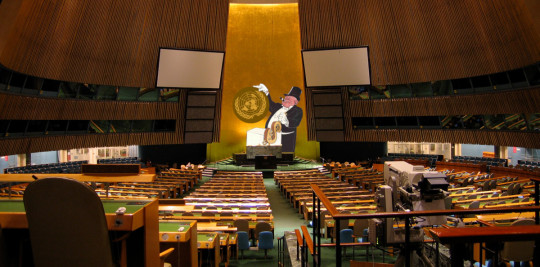#isds
Explore tagged Tumblr posts
Text
Ideas Lying Around

I'm on a 20+ city book tour for my new novel PICKS AND SHOVELS. Catch me in DC TOMORROW (Mar 4), and in RICHMOND on WEDNESDAY (Mar 5). More tour dates here. Mail-order signed copies from LA's Diesel Books.

I get a special pleasure from citing Milton Friedman. I like to imagine that as I do, he groans around the red-hot spit protruding from his jaws, prompting howls of laughter from the demons who pelt him with molten faeces for all eternity.
If you're lucky enough not to know about Friedman, here's the short version. Friedman was a kind of court sorcerer to Ronald Reagan, Margaret Thatcher, Augusto Pinochet, and other assorted authoritarian, hard-right leaders who set us on the path to the hellscape we inhabit today. But before Friedman rose to prominence and influence, he was a crank. Specifically, he was a crank who dedicated his life to rolling back all the progress of the New Deal and re-establishing the Gilded Age:
https://pluralistic.net/2022/11/06/the-end-of-the-road-to-serfdom/
In his crank days, people were justifiably skeptical of this project. "Milton," they'd say, "people like New Deal programs. They like the minimum wage, the 40-hour work-week, and the assurance that they won't be maimed, poisoned, burned alive, or otherwise killed on the job. They relish a dignified retirement, quality education for their children, and the assurance that no one is starving to death in their country's borders. People like national parks! They like Medicare! They like libraries, museums, and reliable weather forecasts! How, Milton, do you propose to convince the vast majority of people that they should settle for being forelock-tugging plebs, groveling before their social betters for the chance to scrub their toilets?"
Friedman had an answer: "In times of crisis, ideas can move from the fringe to the center in an eyeblink. Our job is to keep good ideas lying around, in anticipation of that crisis."
When the oil crisis hit, when prices spiked in the USA and abroad, Friedman seized his opportunity. The years following the oil crisis saw a violent political revolution in which organized labor, social justice movements, and the political opposition to oligarchy were crushed under police batons and the guns of Pinochet's thugs. The world was transformed. Left parties like UK Labour were remade as austerity-pilled neoliberals (not for nothing did Margaret Thatcher call Tony Blair "her greatest accomplishment," and it took Bill Clinton to pass a welfare "reform" bill that was too extreme even for Reagan to get through Congress).
Friedman was a monster.
But.
He had a hell of a theory of change.
When prices spiral, when people can't pay their bills anymore, when their retirement savings are wiped out, anything is possible. The oil crisis wasn't Jimmy Carter's fault, but the voters still delivered a Ba'ath Party-style Republican majority in 1980. The covid shocks weren't the fault of the world governments that presided over pandemic inflation, but they were creamed in the ensuing elections.
Let's talk about Trump's tariffs here. Trump's goal is to force a re-shoring of the American industrial capacity that was shipped to low-wage, low-regulation corporate havens around the world after the Reagan revolution. The pandemic provided a vivid lesson about the problems with long, brittle supply chains where all the slack has been extracted and converted to dividends and stock buybacks. That kind of system may work well – at least to the extent that it keeps Walmart's shelves full of cheap goods – but holy shit did it ever fail badly. Re-shoring is a good idea, as are other forms of pro-resiliency industrial policy.
But re-shoring doesn't happen overnight. As we saw during China's covid lockdowns, when one supplier ceases to ship goods, other suppliers can't spring up overnight to take up the slack. China itself became a manufacturing powerhouse thanks to extensive state support and planning, and it took decades. That kind of patient, long-run, planned process is the best-case scenario (and it still caused wrenching dislocations to Chinese society). Simply throwing up tariff walls and demanding that industry figure it out – amid the resulting economic chaos and the political instability it brings – isn't a plan, it's a disaster.
Redistributing the means of production around the world is a necessary and urgent project, but it won't be advanced through Trump's rapid, unscheduled mid-air disassembly of the global system of trade. Tariffs will cause breakdowns in neoliberalism's fragile supply chains, and the ensuing chaos – mass unemployment, shortages, political rage – will make it even harder for countries (including the USA) to rebuild the productive capacity vaporized by 40 years of neoliberalism.
This is our oil crisis, in other worlds: a moment in which a belligerent superpower's ill-considered monkeying with the underpinnings of global production will cause chaos, the crisis in which "ideas can move from the periphery to the center" in an eyeblink. If Steve Bannon can call himself a Leninist, then leftists can call themselves Friedmanites. This is our opportunity.
Or rather, it's our opportunity to seize – or lose. Governments are defaulting to retaliatory tariffs as the best response to Trump's tariffs. This is political poison: making everything your country imports from the USA more expensive is a very weird way to punish America for its trade war. Remember the glaring lesson of pandemic inflation: a government that presides over rising prices will be destroyed by the electorate.
There's a much better alternative, one that strikes at the very roots of American oligarchy, whose extreme wealth and corrosive political influence comes from its holdings in rent-extracting monopolies, especially Big Tech monopolies.
Tech giants are the major factor in US economic health. Take Big Tech stocks out of the S&P 500 and you've got a stagnant market punctuated by periods of decline. Superficially, US tech companies have different sources of extraordinary profit, but a closer look reveals that they all share the same foundation: Big Tech makes the bulk of its money in the form of monopoly rents, backstopped by global IP treaties.
Apple and Google take a 30% cut of every dollar spent in an app, and it's a felony to jailbreak a phone to make a new app store with the industry standard 1-3% transaction fees. Google and Meta take 51% out of every ad dollar, and publishers and advertisers are locked into their ecosystems by abusive contracts and technological countermeasures. HP charges $10,000/gallon for the colored water you put in your printer, and third-party ink and refills violate the anti-circumvention laws the US has crammed down the throats of every country's legislature. Tesla makes its fattest margins by renting you features that are installed in your car at the factory, from autopilot to the ability to use your battery's whole charge, raking in monthly fees from you and anyone you sell your car to – and the reason your mechanic can't just permanently unlock all that DLC for $50 is the IP laws that your country agreed to enforce in order to trade with the USA. Mechanics pay $10k/year per manufacturer for the tools to interpret the error codes generated by your car, and the only reason no one is selling a $50/month universal diagnostic service is – once again – US-originated IP laws that came in a parcel with trade agreements that gave your country's exporters access to US markets. Farmers pay John Deere $200 every time they fix their own tractors, because the repairs won't work until a technician comes out and types an unlock code into the tractor's keyboard – and bypassing that unlock code is a crime under the laws passed to comply with international treaties.
These aren't profits – they're rents. It's money Big Tech gets from owning a factor of production, not money it gets from actually making something. The app maker takes all the risks, but Apple and Google cream off 30% of their gross income. Big Tech's profits are almost an afterthought when compared to its rents, the junk-fee platform fees and farcically expensive consumables. For tech firms, capitalism was a transitional phase between feudalism…and technofeudalism:
https://pluralistic.net/2023/09/28/cloudalists/#cloud-capital
America's robust GDP figures are a mirage, artificially buoyed up by the monopoly rents extracted by US Big Tech, who prey on Americans and foreigners:
https://pluralistic.net/2025/02/18/pikettys-productivity/#reaganomics-revenge
But foreigners don't have to tolerate this nonsense. Governments around the world signed up to protect giant American companies from small domestic competitors (from local app stores – for phones, games consoles, and IoT gadgets – to local printer cartridge remanufacturers) on the promise of tariff-free access to US markets. With Trump imposing tariffs will-ye or nill-ye on America's trading partners large and small, there is no reason to go on delivering rents to US Big Tech.
The first country or bloc (hi there, EU!) to do this will have a giant first-mover advantage, and could become a global export powerhouse, dominating the lucrative markets for tools that strike at the highest-margin lines of business of the most profitable companies in the history of the human race. Like Jeff Bezos told the publishers: "your margin is my opportunity":
https://www.marketplacepulse.com/articles/the-cost-of-your-margin-is-my-opportunity
In times of crisis, ideas can move from the periphery to the center in an eyeblink. Many of us have spent decades organizing and mobilizing against these extractive, dangerous, destabilizing abuses of technology, where the computer-powered devices we rely on for everything are designed to serve their manufacturers' shareholders, at our expense. And yet, these technologies have only proliferated, infecting everything from insulin pumps and ventilators to coffee makers and "smart" TVs.
It's time for a global race to the top – for countries to compete with one another to see who will capture US Big Tech's margins the fastest and most aggressively. Not only will this make things cheaper for everyone else in the world – it'll also make things cheaper for Americans, because once there is a global, profitable trade in software that jailbreaks your Big Tech devices and services, it will surely leak across the US border. Canada doesn't have to confine itself to selling reasonably priced pharmaceuticals to beleaguered Americans – it can also set up a brisk trade in the tools of technological self-determination and liberation from Big Tech bondage.
Taking the margins for Big Tech's most profitable enterprises to zero, globally, will strike at the very heart of American oligarchy, and the hundreds of millions tech giants flushed into the political system to put Trump into office again. A race to the top for technological liberation benefits everyone – including Americans.
Truly, it would be a rising tide that lifted all boats (except for oligarchs' superyachts - those, it will swamp and sink).

If you'd like an essay-formatted version of this post to read or share, here's a link to it on pluralistic.net, my surveillance-free, ad-free, tracker-free blog:
https://pluralistic.net/2025/03/03/friedmanite/#oil-crisis-two-point-oh

#pluralistic#ideas lying around#milton friedman#global trade#trade#tariffs#oil crisis#theories of change#trumpism#anticircumvention#dmca 1201#gatt#wto#isds#investor state dispute settlement
438 notes
·
View notes
Text

I hope they danced in the bar as young adults, not stressing over the revolution, just living it up
#my art#sketchy sketch#arcane#arcane spoilers#arcane season 2#arcane season 2 spoilers#i guess#young silco#young vander#silco#vander#zaundads#vanco#I just ghhhh I jhust need them to be isd okin love in love they are#in every universe#the toxicity levels varies#i bet vander can only slowdance#and silco learned everything from felicia
12K notes
·
View notes
Text
Excerpt from this story from Inside Climate News:
Before the sun set on his inauguration day, Joe Biden reversed a raft of his predecessor’s deregulation policies with the stroke of a pen. Among them was an order revoking the permit for the controversial Keystone XL oil pipeline.
Canceling the project was a campaign pledge to address the climate crisis. But looming over that decision was the risk that an obscure but powerful international legal system could force the United States to pay billions of dollars to Keystone XL’s Canadian developer, TC Energy.
That system—embedded in thousands of trade and investment treaties—allows corporations to drag governments before panels of arbitrators, usually behind closed doors. Governments have been ordered to pay billions of dollars in damages to oil and mining companies for violating those treaties. While the system was intended to protect foreign investors from unfair treatment or asset seizure, many environmental advocates, lawyers and politicians say it is now being used to win awards from governments that enact new environmental regulations or raise taxes on polluting industries.
Increasingly, these critics warn the system threatens climate action by punishing governments that phase out fossil fuels.
The $15 billion claim TC Energy brought against the United States was one of the largest-ever in response to a climate policy. The company lost earlier this month, but the case was dismissed on a technicality and its outcome says nothing about other pending cases around the world.
Australia, Canada, Colombia and Slovenia are facing tens of billions of dollars in claims from companies for phasing out coal power plants, rejecting mining licenses or disallowing liquefied natural gas permits. In 2022, Italy was ordered to pay a British oil company roughly $200 million after offshore drilling restrictions upended the firm’s development plans.
In other countries, the system set up for these claims—investor-state dispute settlement, or ISDS—has driven up costs of closing coal power plants, prevented governments from canceling oil and gas licenses or otherwise impeded efforts to reduce fossil fuel use, government ministers and researchers say. Companies even win awards despite leaving behind environmental contamination, violating human rights or breaking national laws.
The ISDS system is uniquely daunting for governments because arbitrators overseeing the cases can award compensation not just for real losses but also for unearned, expected future profits. It’s a key reason awards can balloon into the billions of dollars.
Governments already face numerous practical and political obstacles as they attempt to move away from fossil fuels, said Canadian lawyer and professor Gus Van Harten, who has studied ISDS’s evolution for decades. “This system is providing an unwarranted and unexpected further minefield.”
As Mary Robinson, former president of Ireland, put it in a speech this year: “I cannot overstate just how perverse this is.”
1 note
·
View note
Text
There is an obscure mechanism by which fossil fuel companies maintain their global domination even as their products are destroying our futures. Most rank-and-file climate activists haven’t heard of it and most news media rarely discuss it in great detail. It is a tool that has its origins in colonialism and advantages corporate power over democracy. The technical term for such a tool is “Investor-state dispute settlement” or ISDS. And while it sounds boring and technical, it is crucial that we familiarize ourselves with it in order to dismantle it.
The Global ISDS tracker, a newly launched online database, describes these as “secretive corporate tribunals.” When nations enter into trade agreements with one another, they usually include a clause on using the benign-sounding ISDS to resolve corporate disputes with national regulators. In other words, if a corporation originating in one nation sees its profits threatened by regulations or nationalization in another nation, it can sue that second government.
When applied to curbing carbon emissions in order to save our planet’s ability to sustain life, one can see that such tribunals can be extremely problematic. Country A decides to transition away from the oil and gas industry toward green, renewable energy. However, an oil company based in Country B sues via an ISDS agreement to extract its lost profits. That’s precisely what is happening, to the tune of $327 billion, according to the Global ISDS Tracker. “[F]ossil fuel cases… can devastate public budgets or even bankrupt a country.”
For example, Nigeria is currently facing a massive set of damages determined by an ISDS tribunal to be paid to a UK-based company for a gas project to the tune of 30 percent of the entire nation’s foreign exchange reserves. And, foreign mining companies are demanding $30 billion from the Republic of Congo using ISDS tribunals. That’s twice the amount of Congo’s gross domestic product (GDP).
Former UN climate envoy and former Irish President Mary Robinson, who said she was “outraged” when she found out about oil and gas companies using ISDS to extort nations, explained that “if countries do the right thing on climate, they have to compensate fossil fuel companies.” Where did ISDSs come from and how are they remotely justifiable in an era when society broadly agrees on democracy as the best form of government? Former U.S. President Barack Obama’s administration explained in the context of the 2016 free trade agreement called the Trans-Pacific Partnership, that “ISDS is specifically designed to protect American investors abroad from discrimination and denial of justice,” and that it is a “more peaceful, better way to resolve trade conflicts” compared to the “gunboat diplomacy” of earlier eras. […]
According to a 2023 report by David Boyd, the UN’s special rapporteur on human rights and the environment, “[o]f the 12 largest ISDS awards to date, 11 involve cases brought by fossil fuel and mining investors.” The $95 billion they extracted from nations using ISDS “likely exceeds the total amount of damages awarded by all courts to victims of human rights violations in all States worldwide, ever,” wrote Boyd.
The Pulitzer Prize-winning media outlet Inside Climate News prefers to call ISDS “economic colonialism,” especially given that “the majority of cases have been filed by corporations from the United States, Europe, and Canada against developing nations.” Colonialism is a fitting descriptor. Gus Van Harten explained in his 2020 book “The Trouble with Foreign Investor Protection,” that ISDS treaties “originate in the efforts of former colonial powers and international organizations, especially the World Bank, to constrain newly independent countries.” In other words, ISDS is a means by which to extend colonialism after the end of physical occupation.
Joseph Stiglitz, a Nobel prize-winning economist, prefers even harsher terminology. He called ISDS mechanisms “litigation terrorism,” because they “instill fear of environmental regulations, climate regulations because you know that it’s going to be costly” for governments.
British commentators had pressured the UK government to exit from treaties such as the “Energy Charter Treaty” (ECT) that require ISDS tribunals. In February 2024, the UK announced it would quit the ECT, following in the footsteps of France, Germany, Spain, and the Netherlands. Most recently Members of the European Parliament also backed a proposal to end its ECT membership. It was called a “historic” vote against a treaty seen as a “climate killer.” It’s time for the U.S. to do the same. Last November, hundreds of climate justice and civil society groups signed on to a letter urging President Joe Biden to end ISDS mechanisms built into a trade agreement with nearly a dozen Latin American and Caribbean nations called Americas Partnership for Economic Prosperity. The signatories explained that ISDS was “a global governance regime that prioritizes corporate rights over those of governments, people, and the planet.”
This was followed by a similar letter in December 2023 signed by more than 40 lawmakers from the Senate and House urging Biden to remove ISDS provisions from all trade agreements. The signatories, including Senators Elizabeth Warren and Sheldon Whitehouse, lauded Biden for his “powerful action when he shut down the Keystone XL pipeline project, preventing the construction of a tar sands oil pipeline,” and pointed out that “TC Energy (formerly known as TransCanada)—the company behind the now-defunct pipeline—has filed an ISDS claim for billions of dollars to be litigated not in an American court, but in a shady international tribunal.”
What good does it do Biden and the U.S. for him to be a climate champion if any steps he takes to undermine fossil fuel domination are countered by a powerful and secretive corporate weapon? Momentum against ISDS provisions is growing. In April 2024, hundreds of academics in law and economics also wrote to Biden urging him to “eliminate ISDS liability from existing agreements,” and offering valuable expertise on how it can be done. Biden had said in 2020 that he was against ISDS provisions—in spite of his role as Vice President to the pro-ISDS Obama. In a letter to the United Steelworkers union, he said “I oppose the ability of private corporations to attack labor, health, and environmental policies through the investor-state dispute settlement (ISDS) process, and I oppose the inclusion of such provisions in future trade agreements.” But what about current trade agreements? It’s troubling that multinational corporations from the U.S. launched the highest number of ISDS cases worldwide. The U.S. is currently the top producer of crude oil in the world. U.S. oil and gas companies are reaping extraordinarily high profits while taking advantage of billions of dollars of public subsidies in the form of tax breaks. The least Biden can do to curb a deadly industry that is threatening our entire species is to take action against ISDS provisions in existing trade agreements.
0 notes
Text
Most Effective Way to Increase Brand Visibility

Festive season is the best time to increase your brand's visibility and sales. Partner with us to get well-trained promoters, BAs, and ISDs to directly engage with your customers at the point of purchase and increase your brand's visibility and sales. It's time to make the best out of this festive season. Experience hassle-free End-to-End managed services solutions tailored to your needs.
Connect with us at 1800-257-7750 or Visit https://www.loveinstore.com/
0 notes
Text

#my memes#star wars#star wars eu#star wars memes#grand admiral thrawn#thrawn#mitth'raw'nuruodo#galactic empire#nightsister merrin#nightsisters of dathomir#ahsoka series#ahsoka show#ahsoka memes#star wars ahsoka#jedi fallen order#jedi survivor#star wars jedi fallen order#star wars jedi survivor#dathomir#isd chimaera#this will be how they bring them in to live action#cal kestis#cal ketsis#kata akuna
4K notes
·
View notes
Text

idk who needs to see this but here's the Chimaera aka Thrawn's flagship aka the sexiest ship in the galaxy and beyond
(picture taken from the pdf version of Thrawn Treason)
#isd chimaera#thrawn#mitth’raw’nuruodo#star wars#grand admiral thrawn#chimaera#eli vanto#thrawn trilogy#star wars ref#chimaera's bridge
393 notes
·
View notes
Text
Occasionally I try doing digital art and occasionally it is of Thrawn riding an actual chimaera being chased by the ISD Chimaera

This started as a dumb joke on Twitter about multiverse variants of the ISD Chimaera but then I got too into it. I did actually start drawing this on paper but I required the power of zoom to draw his face how I wanted :3
As always, here's the uncoloured version where lies my comfort zone:

Also this drawing is just the three-headed dragon meme and I am so here for it.

#thrawn riding an actual chimaera#star wars#thrawn#fanart#chiss#star wars fanart#timothy zahn#chimaera#ISD Chimaera#my wife#my art#digital art
107 notes
·
View notes
Text
it's always "i'm into cervix penetration" until i pull out the speculum and the medical equipment
#ix#cervix penetration#my beloeved#more ppl should play in the irl space of it of how fucked up and how much ur body isd not Meant to do that
167 notes
·
View notes
Text
End of the line for corporate sovereignty

I'm on tour with my new, nationally bestselling novel The Bezzle! Catch me next weekend (Mar 30/31) in ANAHEIM at WONDERCON, then in Boston with Randall "XKCD" Munroe (Apr 11), then Providence (Apr 12), and beyond!

Back in the 1950s, a new, democratically elected Iranian government nationalized foreign oil interests. The UK and the US then backed a coup, deposing the progressive government with one more hospitable to foreign corporations:
https://en.wikipedia.org/wiki/Nationalization_of_the_Iranian_oil_industry
This nasty piece of geopolitical skullduggery led to the mother-of-all-blowbacks: the Anglo-American puppet regime was toppled by the Ayatollah and his cronies, who have led Iran ever since.
For the US and the UK, the lesson was clear: they needed a less kinetic way to ensure that sovereign countries around the world steered clear of policies that undermined the profits of their oil companies and other commercial giants. Thus, the "investor-state dispute settlement" (ISDS) was born.
The modern ISDS was perfected in the 1990s with the Energy Charter Treaty (ECT). The ECT was meant to foam the runway for western corporations seeking to take over ex-Soviet energy facilities, by making those new post-Glasnost governments promise to never pass laws that would undermine foreign companies' profits.
But as Nick Dearden writes for Jacobin, the western companies that pushed the east into the ECT failed to anticipate that ISDSes have their own form of blowback:
https://jacobin.com/2024/03/energy-charter-treaty-climate-change/
When the 2000s rolled around and countries like the Netherlands and Denmark started to pass rules to limit fossil fuels and promote renewables, German coal companies sued the shit out of these governments and forced them to either back off on their democratically negotiated policies, or to pay gigantic settlements to German corporations.
ISDS settlements are truly grotesque: they're not just a matter of buying out existing investments made by foreign companies and refunding them money spent on them. ISDS tribunals routinely order governments to pay foreign corporations all the profits they might have made from those investments.
For example, the UK company Rockhopper went after Italy for limiting offshore drilling in response to mass protests, and took $350m out of the Italian government. Now, Rockhopper only spent $50m on Adriatic oil exploration – the other $300m was to compensate Rockhopper for the profits it might have made if it actually got to pump oil off the Italian coast.
Governments, both left and right, grew steadily more outraged that ISDSes tied the hands of democratically elected lawmakers and subordinated their national sovereignty to corporate sovereignty. By 2023, nine EU countries were ready to pull out of the ECT.
But the ECT had another trick up its sleeve: a 20-year "sunset" clause that bound countries to go on enforcing the ECT's provisions – including ISDS rulings – for two decades after pulling out of the treaty. This prompted European governments to hit on the strategy of a simultaneous, mass withdrawal from the ECT, which would prevent companies registered in any of the ex-ECT countries from suing under the ECT.
It will not surprise you to learn that the UK did not join this pan-European coalition to wriggle out of the ECT. On the one hand, there's the Tories' commitment to markets above all else (as the Trashfuture podcast often points out, the UK government is the only neoliberal state so committed to austerity that it's actually dismantling its own police force). On the other hand, there's Rishi Sunak's planet-immolating promise to "max out North Sea oil."
But as the rest of the world transitions to renewables, different blocs in the UK – from unions to Tory MPs – are realizing that the country's membership in ECT and its fossil fuel commitment is going to make it a world leader in an increasingly irrelevant boondoggle – and so now the UK is also planning to pull out of the ECT.
As Dearden writes, the oil-loving, market-worshipping UK's departure from the ECT means that the whole idea of ISDSes is in danger. After all, some of the world's poorest countries are also fed up to the eyeballs with ISDSes and threatening to leave treaties that impose them.
One country has already pulled out: Honduras. Honduras is home to Prospera, a libertarian autonomous zone on the island of Roatan. Prospera was born after a US-backed drug kingpin named Porfirio Lobo Sosa overthrew the democratic government of Manuel Zelaya in 2009.
The Lobo Sosa regime established a system of special economic zones (known by their Spanish acronym, "ZEDEs"). Foreign investors who established a ZEDE would be exempted from Honduran law, allowing them to create "charter cities" with their own private criminal and civil code and tax system.
This was so extreme that the Honduran supreme court rejected the plan, so Lobo Sosa fired the court and replaced them with cronies who'd back his play.
A group of crypto bros capitalized on this development, using various ruses to establish a ZEDE on the island of Roatan, a largely English-speaking, Afro-Carribean island known for its marine reserve, its SCUBA diving, and its cruise ship port. This "charter city" included every bizarre idea from the long history of doomed "libertarian exit" projects, so ably recounted in Raymond Craib's excellent 2022 book Adventure Capitalism:
https://pluralistic.net/2022/06/14/this-way-to-the-egress/#terra-nullius
Right from the start, Prospera was ill starred. Paul Romer, the Nobel-winning economist most closely associated with the idea of charter cities, disavowed the project. Locals hated it – the tourist shops and restaurants on Roatan all may sport dusty "Bitcoin accepted here" signs, but not one of those shops takes cryptocurrency.
But the real danger to Prospera came from democracy itself. When Xiomara Castro – wife of Manuel Zelaya – was elected president in 2021, she announced an end to the ZEDE program. Prospera countered by suing Honduras under the ISDS provisions of the Central America Free Trade Agreements, seeking $10b, a third of the country's GDP.
In response, President Castro announced her country's departure from CAFTA, and the World Bank's International Centre for Settlement of Investment Disputes:
https://theintercept.com/2024/03/19/honduras-crypto-investors-world-bank-prospera/
An open letter by progressive economists in support of President Castro condemns ISDSes for costing latinamerican countries $30b in corporate compensation, triggered by laws protecting labor rights, vulnerable ecosystems and the climate:
https://progressive.international/wire/2024-03-18-economists-the-era-of-corporate-supremacy-in-the-international-trade-system-is-coming-to-an-end/en
As Ryan Grim writes for The Intercept, the ZEDE law is wildly unpopular with the Honduran people, and Merrick Garland called the Lobo Sosa regime that created it "a narco-state where violent drug traffickers were allowed to operate with virtual impunity":
https://theintercept.com/2024/03/19/honduras-crypto-investors-world-bank-prospera/
The world's worst people are furious and terrified about Honduras's withdrawal from its ISDS. After 60+ years of wrapping democracy in chains to protect corporate profits, the collapse of the corporate kangaroo courts that override democratic laws represents a serious threat to oligarchy.
As Dearden writes, "elsewhere in the world, ISDS cases have been brought specifically on the basis that governments have not done enough to suppress protest movements in the interests of foreign capital."
It's not just poor countries in the global south, either. When Australia passed a plain-packaging law for tobacco, Philip Morris relocated offshore in order to bring an ISDS case against the Australian government in a bid to remove impediments to tobacco sales:
https://isds.bilaterals.org/?philip-morris-vs-australia-isds
And in 2015, the WTO sanctioned the US government for its "dolphin-safe" tuna labeling, arguing that this eroded the profits of corporations that fished for tuna in ways that killed a lot of dolphins:
https://theintercept.com/2015/11/24/wto-ruling-on-dolphin-safe-tuna-labeling-illustrates-supremacy-of-trade-agreements/
In Canada, the Conservative hero Steven Harper entered into the Canada-China Foreign Investment Promotion and Protection Agreement, which banned Canada from passing laws that undermined the profits of Chinese corporations for 31 years (the rule expires in 2045):
https://www.vancouverobserver.com/news/harper-oks-potentially-unconstitutional-china-canada-fipa-deal-coming-force-october-1
Harper's successor, Justin Trudeau, went on to sign the Canada-EU Trade Agreement that Harper negotiated, including its ISDS provisions that let EU corporations override Canadian laws:
https://www.cbc.ca/news/politics/trudeau-eu-parliament-schulz-ceta-1.3415689
There was a time when any challenge to ISDS was a political third rail. Back in 2015, even hinting that ISDSes should be slightly modified would send corporate thinktanks into a frenzy:
https://www.techdirt.com/2015/07/20/eu-proposes-to-reform-corporate-sovereignty-slightly-us-think-tank-goes-into-panic-mode/
But over the years, there's been a growing consensus that nations can only be sovereign if corporations aren't. It's one thing to treat corporations as "persons," but another thing altogether to elevate them above personhood and subordinate entire nations to their whims.
With the world's richest countries pulling out of ISDSes alongside the world's poorest ones, it's feeling like the end of the road for this particularly nasty form of corporate corruption.
And not a moment too soon.

If you'd like an essay-formatted version of this post to read or share, here's a link to it on pluralistic.net, my surveillance-free, ad-free, tracker-free blog:
https://pluralistic.net/2024/03/27/korporate-kangaroo-kourts/#corporate-sovereignty

Image: ChrisErbach (modified) https://commons.wikimedia.org/wiki/File:UnitedNations_GeneralAssemblyChamber.jpg
CC BY-SA 3.0 https://creativecommons.org/licenses/by-sa/3.0/deed.en
#pluralistic#isds#investor state dispute settlement#steven harper#canada#canpoli#ukpoli#honduras#prospera#roatan#Energy Charter Treaty#ect#eu#rockhopper#world bank#charter cities#cryptocurrency#libertarian exit#Xiomara Castro
222 notes
·
View notes
Text
Thrawn in 'Tyrants of Lothal' card game.





#star wars#grand admiral thrawn#galactic empire#thrawn#thrawn trilogy#game#star wars cards#star wars games#star wars game#star wars card game#grand admiral thrawn legends#mitthrawnuruodo#mitth'raw'nuruodo#imperial officer#ISD chimaera#imperial star destroyer#chimaera crew#chiss ascendancy
104 notes
·
View notes
Text
Thrawn: [*chillin' on the floor in his office with art holos on*]
Karyn: How long does he stay like this?
Eli: Longest was nine hours once.
Karyn: Kriff- does he take breaks to go eat?
Eli: Pfft. No. That's why I throw a few ration bars at him every few hours.
Karyn: And he doesn't mind you throwing them at him? I've seen your arm.
Eli: *Takes a bar out of his pocket* watch.
Eli: *Fangs it at Thrawn's head*
Thrawn, without coming out of his trance: *catches it*
Karyn: Stars-
Eli: See? Fine.
Thrawn, still sort of out of it: Throw it harder next time.
Eli: Yes, sir.
Karyn: HARDER??
Thrawn: It's how I remember I have a body
Karyn: oH-
#thrawn#karyn faro#eli vanto#isd chimaera shenanigans#the art void#grand admiral thrawn#commodore faro#lieutenant commander vanto
289 notes
·
View notes
Text





The Chimaera & the Eye of Sion in Ahsoka 1.08 The Jedi, the Witch, and the Warlord
#orbital bombardment 😍#isd chimaera#thrawn#ahsoka spoilers#ahsoka#star wars#ahsokaedit#swedit#**#*gffa#*ahsoka tv#*chimaera#flashing gif tw
986 notes
·
View notes
Text





ISD Chimaera
#there she is#the sexiest ship in the galaxy#isd chimaera#grand admiral thrawn#mitth'raw'nuruodo#ahsoka spoilers#star wars#my gifs
673 notes
·
View notes
Text

Imperial Star Destroyer by Joe Johnston, 1977
593 notes
·
View notes
Text
S. Baum at Erin In The Morning:
An anonymous claim alleging that teachers in Texas might have used a trans student’s preferred name and pronouns has invoked the wrath of Governor Greg Abbott and Attorney General Ken Paxton — opening the floodgates for legal action against any teacher who supports their LGBTQ students. The scrummage began when Denise Bell, an activist with Moms for Liberty — an anti-government, anti-LGBTQ rights group — read a statement, supposedly on behalf of the unnamed complainant, to the Houston Independent School District board on February 13. “Multiple teachers started calling [this student] by a different name and pronouns,” Bell said. “This occurred without [the parent’s] knowledge and certainly without our consent. This goes against our Christian faith, the advice of [their] therapist and quite frankly common sense.” She ended the speech with a pronounced allegation: “HISD is purposely and secretively transitioning minors.” There is no public evidence to support this claim, but this has not stopped Governor Abbott from sinking his teeth into the high school in question. On March 13, 2025, he sent a letter to State Representative Steve Toth, a Republican who does not represent the district of the high school where the incident took place. Toth seemingly flagged the incident with Governor Abbott, and Abbott thanked him for “highlighting the inappropriate, and potentially unlawful” actions of educators. Abbott then said the Texas Education Agency would launch a probe into the district with law enforcement “to determine whether a student at Bellaire High School has been subjected to abuse or neglect,” and that they would “consider rulemaking to reaffirm that socially transitioning students or encouraging students to transition will result in disciplinary action and may require schools to report and investigate such actions for child abuse or neglect.” Abbott’s memo quoted case law which decreed that “[a] child is not a mere creature of the state” and that “custody, care and nurture of the child reside[s] first with the parents.” In this case, he says, by using the child’s pronouns, teachers are “violating the express wishes of the child’s mother,” who purportedly does not support the child’s trans identity. “No school should be ‘transitioning’ children,” Abbott wrote. “Parental rights are not stripped once a child enters a classroom.”
[...] At the HISD hearing, the Moms for Liberty’s activist was flanked by Emelie Schmidt, a self-proclaimed “detransitioner” in her mid-twenties, who made similar claims about teachers in another part of Texas. When she asked her old high school teachers to use a new name and pronouns for her, she said some of them obliged. Schmidt’s district is also not part of HISD, but Schmidt has become a fixture of the Texas anti-trans movement in recent years. She has traveled from district to district preaching anti-trans rhetoric and made appearances at committee hearings at the State Capitol, according to HoustonPress. Neither Schmidt’s school nor HISD prescribed any children with hormones or surgical procedures at any time. No teacher in either situation is accused of forcing students to socially or medically transition. Studies show that allowing a child to socially transition, even if they do change their gender identity later on, is a net good for their health and wellbeing. “There is no evidence that social transition per se leads to unnecessary medical transition,” bioethicist Dr. Simona Giordano wrote in an article in the Journal of Medical Ethics. “Social transition should be viewed as a tool to find out what is the right trajectory for the particular child.”
Is Texas “Governor” Greg Abbott (R) so hateful and deluded?! Yes, he is.
See Also:
NCRM: Texas to Investigate Anonymous Complaint Teachers Used Trans Student’s Pronouns
#Texas#Greg Abbott#Child Abuse#Anti Trans Extremism#Transgender#Pronouns#Gender Identity#Moms For Liberty#Denise Bell#Houston ISD#Emelie Schmidt#Political Detransitioners#Social Transition
47 notes
·
View notes